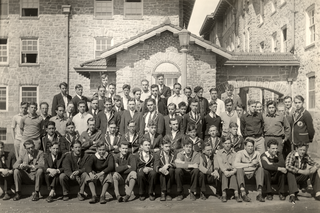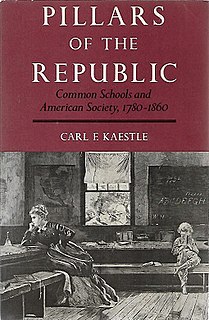Related Research Articles

The University of Wisconsin–Superior is a public liberal arts university in Superior, Wisconsin. UW–Superior grants associate, bachelor's, master's, and specialist's degrees. The university enrolls about 2,500 undergraduates and 200 graduate students.

The "Wisconsin Idea"is a public philosophy that has influenced policy and ideals in the U.S. state of Wisconsin's education system and politics. In education, emphasis is often placed on how the Idea articulates education's role for Wisconsin's government and inhabitants. In politics, the Idea is most associated with the historic political upheaval and subsequent reformation during the Progressive Era in the United States.

The University of Wisconsin–La Crosse is a public university in La Crosse, Wisconsin. Founded in 1909, it is a leading comprehensive university as part of the University of Wisconsin System offering bachelor's, master's, and doctoral degrees. With 9,600 undergraduate and 1,000 graduate students, UW-La Crosse is composed of four schools and colleges offering 102 undergraduate programs, 31 graduate programs, and 2 doctoral programs. UW-La Crosse has nearly 85,000 alumni across all 50 U.S. states and 57 countries.

The University of Wisconsin–Madison School of Education is a school within the University of Wisconsin–Madison. Although teacher education was offered at the university’s founding in 1848, the School was officially started in 1930 and today is composed of 10 academic departments. U.S. News & World Report in its 2016 Best Grad School rankings rated UW-Madison's School of Education No. 1 among public institutions and tied for fourth overall. In all, seven UW-Madison education specialty programs were ranked by U.S. News among the top three nationally. Diana Hess succeeded Julie Underwood as the school's ninth dean in August 2015.
A bibliography of the history of education in the United States comprises tens of thousands of books, articles and dissertations. This is a highly selected guide to the most useful studies.

Donald Alexander Downs is an American political science professor at the University of Wisconsin-Madison known for his work on the First Amendment.

The University of Wisconsin–Madison is a public land-grant research university in Madison, Wisconsin. Founded when Wisconsin achieved statehood in 1848, UW–Madison is the official state university of Wisconsin and the flagship campus of the University of Wisconsin System. It was the first public university established in Wisconsin and remains the oldest and largest public university in the state. It became a land-grant institution in 1866. The 933-acre (378 ha) main campus, located on the shores of Lake Mendota, includes four National Historic Landmarks. The university also owns and operates a historic 1,200-acre (486 ha) arboretum established in 1932, located 4 miles (6.4 km) south of the main campus.

James Danky is an American historian, bibliographer, and culture critic. He is currently a faculty associate at the University of Wisconsin-Madison School of Journalism and Mass Communication. Danky is best known as an advocate for collecting alternative and small-press publications during his tenure at the Wisconsin Historical Society.
The Morgridge Institute for Research is a private, nonprofit biomedical research institute in Madison, Wis., affiliated with the University of Wisconsin–Madison. The institute works to improve human health by conducting, enabling and translating interdisciplinary biomedical research. Research in regenerative biology, virology, medical devices and core computational technology is currently underway.

Constance Steinkuehler (Squire) is an American professor of Informatics at the University of California–Irvine. She previously taught at the University of Wisconsin-Madison before taking public service leave, from 2011-2012, to work as a Senior Policy Analyst in the Office of Science and Technology Policy (OSTP) at the White House Executive Office, where she advised on policy matters about video games and learning.
James P. Leary is a folklorist and scholar of Scandinavian studies, and a professor at the University of Wisconsin–Madison.

John Whelan Sterling was a pioneer faculty member of the University of Wisconsin - Madison. When the first university chancellor John Hiram Lathrop opened the school in 1849, he and Sterling were the only two professors. As an early faculty member and in his capacity as dean of faculty and vice chancellor from 1861-1867, Sterling was often called the "father of the university," despite never holding the office of president or chancellor.
William J. Reese is the Carl F. Kaestle Wisconsin Alumni Research Foundation (WARF) Professor of Educational Policy Studies and History at the University of Wisconsin–Madison. He received a Vilas Distinguished Achievement professorship in May 2015.

The University of Wisconsin Experimental College was a two-year college designed and led by Alexander Meiklejohn inside the University of Wisconsin–Madison with a great books, liberal arts curriculum. It was established in 1927 and closed in 1932. Meiklejohn proposed the idea for an alternative college in a 1925 Century magazine article. The magazine's editor-in-chief, Glenn Frank, became the University of Wisconsin's president and invited Meiklejohn to begin the college within the university. Despite pushback from the faculty, the college opened in the fall of 1927 with a self-governing community of 119 students and less than a dozen faculty. Students followed a uniform curriculum: Periclean Athens for freshmen and modern America for sophomores. The program sought to teach democracy and to foster an intrinsic love of learning within its students.
David B. Tyack was the Vida Jacks Professor of Education and Professor of History, Emeritus at the Stanford Graduate School of Education. Tyack is known for his wide-ranging studies and interpretations of the history of American education.

Pillars of the Republic is history book on the origins of the American common schools written by Carl Kaestle and published by Hill & Wang in 1983.
"Factory model schools", "factory model education", or "industrial era schools" are terms that emerged in the mid to late-20th century and are used by writers and speakers as a rhetorical device by those advocating a change to the American public education system. Generally speaking, when used, the terms are referencing characteristics of European education that emerged in the late 18th century and then in North America in the mid-19th century that include top-down management, outcomes designed to meet societal needs, age-based classrooms, the modern liberal arts curriculum, and a focus on producing results. The phrase is typically used in the context of discussing what the author has identified as negative aspects of public schools. As an example, the "factory model of schools are 'designed to create docile subjects and factory workers'". The phrases are also used to incorrectly suggest the look of American education hasn't changed since the 19th century. Educational historians describe the phrase as misleading and an inaccurate representation of the development of American public education.

Angela Michelle Byars-Winston is a Professor of Internal Medicine at the University of Wisconsin–Madison. She was the first African American to achieve the rank of tenured Full Professor of medicine at the University of Wisconsin–Madison. She studies the impact of culture on career development, in particular for women and minorities in STEM. She is a Fellow of the American Psychological Association and was one of Barack Obama's Champions of Change.
Patricia, "Patty" Loew is a journalist, professor, author, and community historian, broadcaster, documentary film maker, academic and advocate. She has written extensively about Ojibwe treaty rights, sovereignty and the role of Native American media in communicating Indigenous world views.
References
- Notes
- ↑ Reports of the President and the Treasurer. John Simon Guggenheim Memorial Foundation. 1977. p. 55.CS1 maint: discouraged parameter (link)
- 1 2 3 4 5 "Three Professors among new faculty members". The University of Chicago Chronicle. University of Chicago. January 19, 1995. Archived from the original on October 15, 2013. Retrieved October 15, 2013.CS1 maint: discouraged parameter (link)
- 1 2 3 4 5 Pawley, Christine (Winter 2008). "'Success on a Shoestring:' A Center for a Diverse Print Culture History in Modern America" (PDF). Library Trends . University of Illinois. 56 (3): 705–719. doi:10.1353/lib.2008.0016. hdl: 2142/4599 . S2CID 40991642. Archived (PDF) from the original on March 4, 2016. Retrieved October 20, 2013.CS1 maint: discouraged parameter (link)
- ↑ Kaestle, Carl F. (1983). Pillars of the Republic: Common Schools and American Society, 1780-1860 . Hill and Wang. pp. x. ISBN 0809001543.
- ↑ "Carl Kaestle". Teachers College, Columbia University. Archived from the original on March 4, 2016. Retrieved October 15, 2013.CS1 maint: discouraged parameter (link)
- ↑ "The Directory of Research and Researchers at Brown: Carl Kaestle". Brown University. Archived from the original on October 15, 2013. Retrieved October 15, 2013.CS1 maint: discouraged parameter (link)
- 1 2 Graydon, Megan (October 27, 2015). "Elizabeth Hollander, Chicago planner under Harold Washington, dies at 75". Chicago Tribune . Retrieved September 1, 2016.CS1 maint: discouraged parameter (link)
- ↑ Graff, Harvey J. (1985). "Rev. of Pillars of the Republic: Common Schools and American Society, 1780-1860 by Carl F. Kaestle". The Journal of Interdisciplinary History . The MIT Press. 15 (3): 542–544. doi:10.2307/204163. ISSN 0022-1953. JSTOR 204163.
- ↑ Tyack, David (1986). "The common school and American society: a reappraisal". History of Education Quarterly. 26 (2): 301–306. doi:10.2307/368745. JSTOR 368745.
Sources
- Urban, Wayne J., ed. (2011). Leaders in the Historical Study of American Education. Rotterdam: Sense Publishers. ISBN 978-94-6091-753-0.